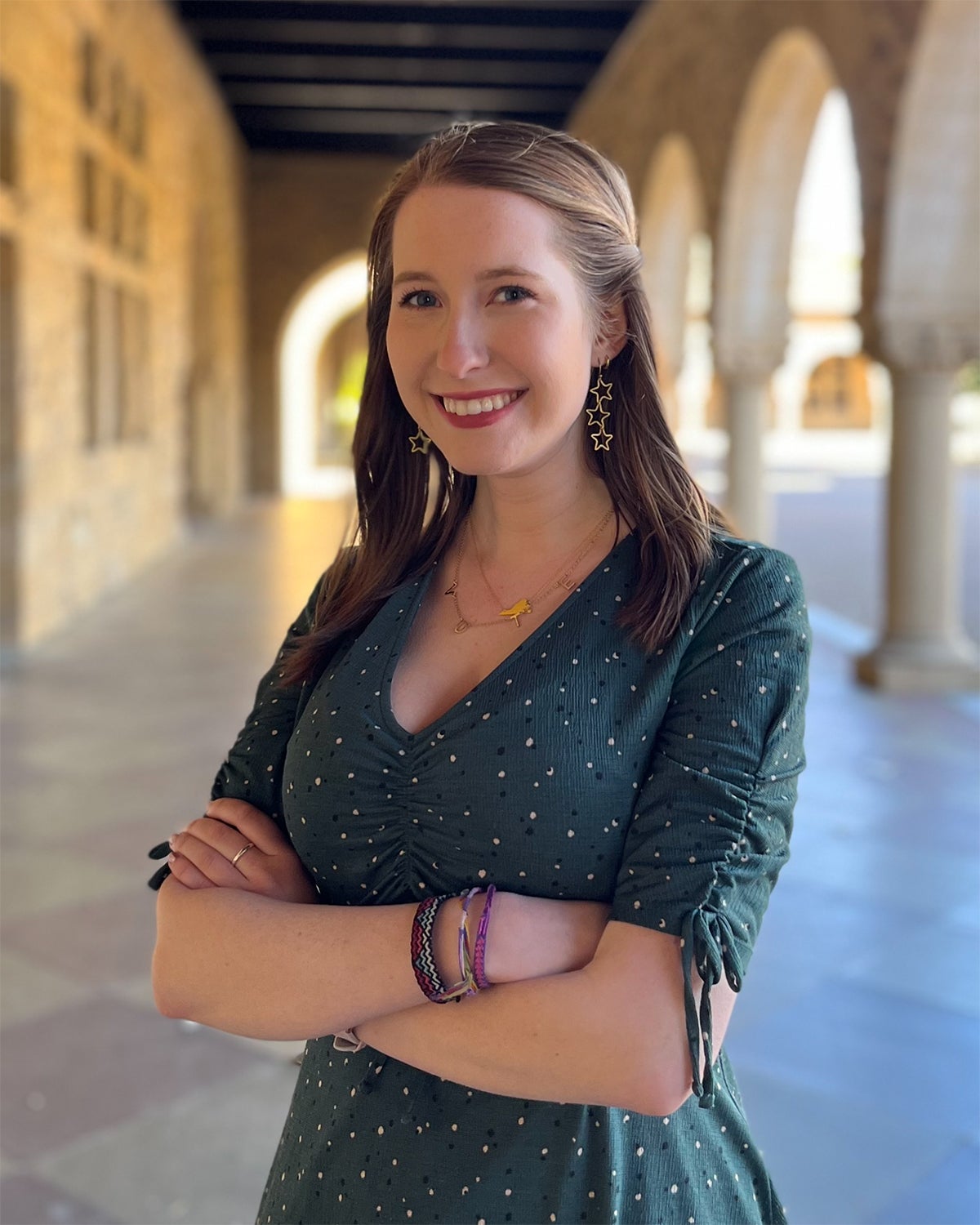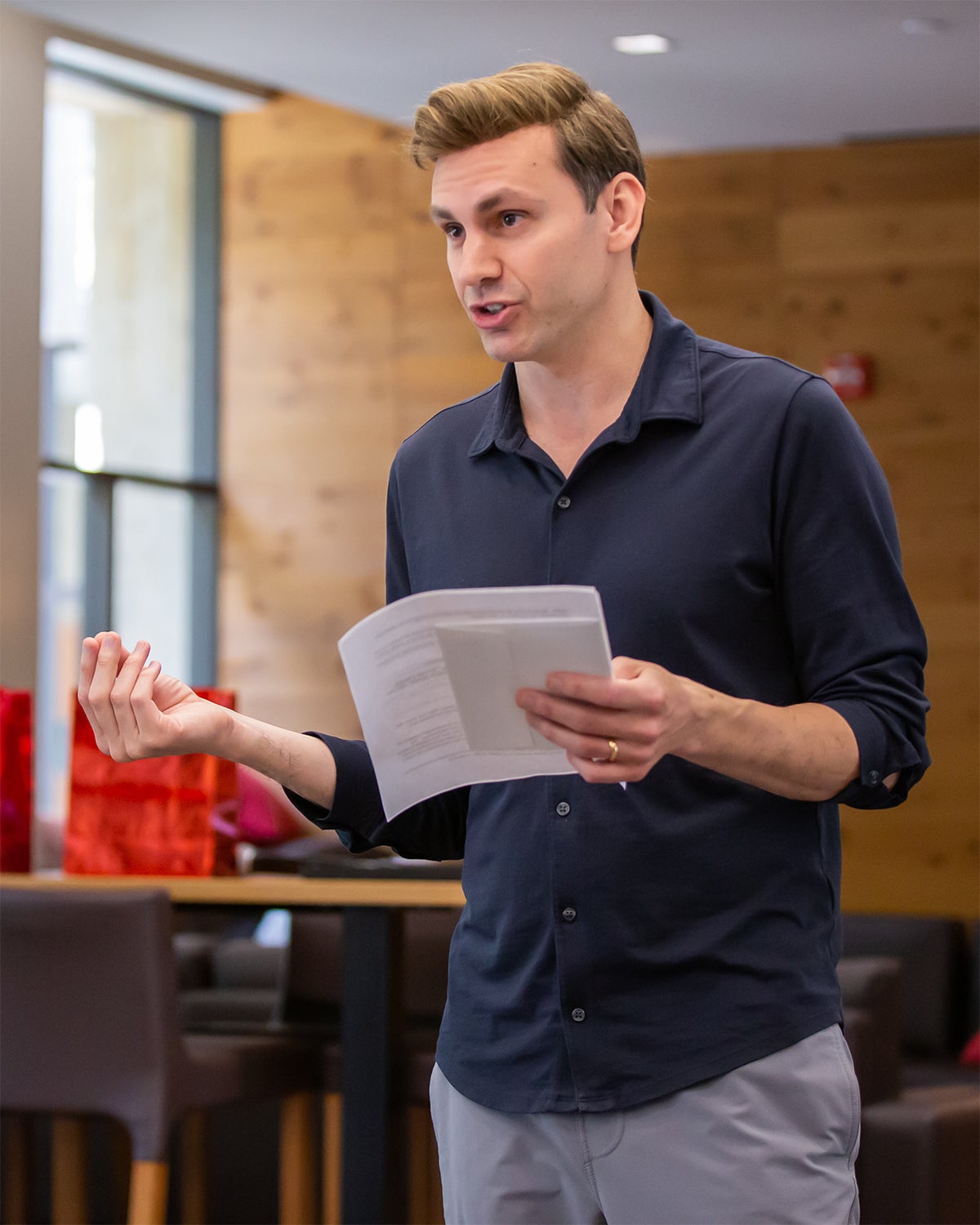“That is an interesting perspective. Have you always thought that way, or has it changed and evolved over time?”

This past year, Stanford senior Liana Keesing participated in the Intercollegiate Civil Disagreement Partnership as a senior fellow. (Image credit: Sala Ba)
“Tell me about the influences that you think most impacted your perspective. Was it your family, your peers, your educators, or perhaps a book?”
Asking questions like these were among the many tactics Stanford senior Liana Keesing learned through her involvement in the Intercollegiate Civil Disagreement Partnership (ICDP), a consortium of five colleges and universities, including Stanford, that brings students from a variety of backgrounds together for meaningful dialogue across political differences.
“Civil disagreement is about holding space for different ways of coming to different beliefs and opinions,” said Keesing, a coterm in electrical engineering. Keesing first got involved as a junior and returned this past year as a senior fellow, where she helped facilitate productive and purposeful conversation among students.
Every other week during the year-long program, some 40 students from across the country gathered over Zoom and for the Stanford cohort, in person, to discuss issues that mattered to them and why.
Bringing people together across political differences and geography
The program emerged during the global pandemic. Collin Anthony Chen, the associate director for undergraduate outreach at the McCoy Family Center for Ethics in Society, wanted to create a space for students to connect with people across their political differences, especially at a time when polarization, partisanship, and distrust in public institutions was running high.

Collin Anthony Chen, associate director for undergraduate outreach at the McCoy Family Center for Ethics in Society, helped create the Intercollegiate Civil Disagreement Partnership. (Image credit: Courtesy Collin Anthony Chen)
Chen connected with his counterparts from ethics centers at four other institutions to form a consortium that represented students from a wide variety of backgrounds.
The program has just completed its third year. The institutions involved include St. Philip’s College in San Antonio, Texas, which is the only college to be federally designated as both a historically Black college and a Hispanic serving institution; California State University, Bakersfield; Santa Fe Community College in Gainesville, Florida; and Harvard University in Cambridge, Massachusetts. This past year, the University of Tennessee, Knoxville, also piloted the program.
A unique aspect of ICDP is the diversity the consortium offers. In addition to representation across the political spectrum, students come from a variety of lived experiences: There were adult learners and others with children. Some participants lived in rural areas, others came from urban settings. There were students who served in the military and those active in local civic life.
Despite these different backgrounds, they were united in one thing: They all wanted to have authentic and sincere conversations with one another.
“Everyone comes in engaging in good faith – that’s huge,” Keesing said.
In the first quarter, students focused first on getting to know one another. Each delivered a presentation – a “civic self-portrait” – about themselves, opening up about their life experiences and how they came to hold the political values they have. The goal was to establish connections and start forming a community based on openness and understanding, both key ingredients for having real, meaningful dialogue.
“You cannot have civil disagreement without some baseline level of trust between people, and that takes time – that’s why the program is a year long,” Chen explained.
Learning to ask questions and disagree
During the second and third quarters, students put civil discourse skills into practice as they discuss and facilitate conversations amongst each other about a range of political issues, such as gun safety, immigration, and female reproductive rights.
“You cannot have civil disagreement without some baseline level of trust between people, and that takes time.”
—Collin Anthony Chen
Associate Director, McCoy Family Center for Ethics in Society
These can be hard and sometimes very personal topics. To navigate these challenges, students learn strategies for asking questions that encourage curiosity and exploration, as well as tools to help them assess how a conversation is going. For example, students are introduced to a “disagreement index” – a thermometer that helps gauge the intensity of a conversation, ranging from cold to simmering to boiling. The sweet spot for a conversation lies at the simmering point, where students move beyond mere “politeness” in conversation and leave their comfort zone. But it identifies limits. When a discussion is overheated, participants are encouraged to pause, check in, and remind one another of the goals of the conversation.
People have complex histories and identities and there might be experiences that have shaped those beliefs at different stages of their lives – an idea students come to appreciate and be reminded of as conversations get heated.
Core to these skills and tools is the idea that engaging in civil discourse is different from having a debate with someone.
“In a debate, you are typically trying to persuade someone that your perspective is right,” Chen explained. “While there is an important place for debate in a democracy, changing someone’s mind is not the goal of the program. Rather, it is about listening and holding empathy for what has shaped or influenced another person’s political stance.”
Challenging assumptions and being courageous
Students are also encouraged to challenge assumptions about people with certain political or personal identities. To accomplish this, ICDP hosted panel events throughout the year that included people with unexpected backgrounds – for example, on a panel focused on women’s reproductive health, Monica Sparks, a Black Democrat who opposed abortion, was featured. The program also hosted religious leader the Rev. Rob Schenck, who was once active in the pro-life movement but later shifted to pro-choice.
Assumptions are also challenged between peers.
Keesing remembers one conversation when the group was talking about police intervention. Their discussion came after the murder of George Floyd, a tragic event that spurred nationwide protests about how some police officers mistreat people of color. Out of those protests was a call for reform. One non-white participant – who, because of discourse at the time, was assumed by other fellows to be in support of defunding the police – spoke up in favor of law enforcement. She shared how she was a survivor of domestic violence and for her, the police were a valuable resource in securing her safety.
Students learned how to be courageous and vulnerable with one another.
“It is a testament to the program that students feel empowered to share aspects of their personal histories that do not fit neatly into one narrative or another,” Chen said. “The dialogues open up space for nuance and vulnerability that is sometimes difficult to find elsewhere.”
“One of the things that ICDP really emphasizes is how many issues are not black and white,” Keesing added. “How do we have discussions that just have more nuance? It really comes down to creating spaces and creating dialogue that allow for so much more gray. Gray is a good thing to get comfortable in.”
Keesing has long been passionate about public service and democracy. In eighth grade, she served as a page in the Virginia State Senate and in high school, was active in student government. At Stanford, she played a critical role in StanfordVotes, a nonpartisan, university-wide, student-led effort to help boost voter turnout among Stanford students, and in 2022 she was the recipient of a Truman Scholarship, which provides support to attend graduate school in preparation for careers in public service.